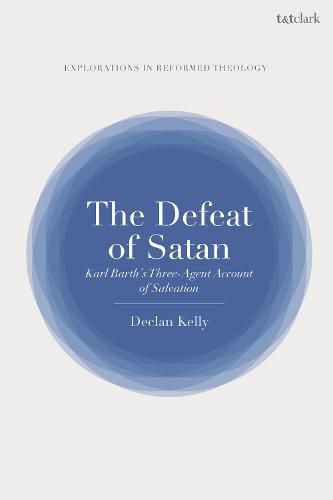Readings Newsletter
Become a Readings Member to make your shopping experience even easier.
Sign in or sign up for free!
You’re not far away from qualifying for FREE standard shipping within Australia
You’ve qualified for FREE standard shipping within Australia
The cart is loading…






This book offers an innovative, critical, and constructive exploration of Barth’s theology, one which demonstrates the radicality of his thought and which underscores the continued contribution he might make to theological reflection on a central element of the Christian tradition.
Declan Kelly uncovers the promise of viewing Barth’s account of salvation as a three-agent drama -a drama involving God, humanity, and anti-God powers. Kelly demonstrates and examines Barth’s cosmological portrayal of God’s saving event as a defeat of the lordship of Satan in the cosmos-and, bound up with this, as an ending of God’s left handed activity-and as the bringing into existence of a new creation under the rule of God’s right hand. Barth’s doctrines of election, the atonement, and the resurrection receive a fresh reading as the book explores his apocalyptic grasp of God’s eschatological deed of salvation and as it puts forward the claim-with and against Barth-that the climax of this deed of salvation is best located in the event of God’s raising of Christ from the dead.
$9.00 standard shipping within Australia
FREE standard shipping within Australia for orders over $100.00
Express & International shipping calculated at checkout
This book offers an innovative, critical, and constructive exploration of Barth’s theology, one which demonstrates the radicality of his thought and which underscores the continued contribution he might make to theological reflection on a central element of the Christian tradition.
Declan Kelly uncovers the promise of viewing Barth’s account of salvation as a three-agent drama -a drama involving God, humanity, and anti-God powers. Kelly demonstrates and examines Barth’s cosmological portrayal of God’s saving event as a defeat of the lordship of Satan in the cosmos-and, bound up with this, as an ending of God’s left handed activity-and as the bringing into existence of a new creation under the rule of God’s right hand. Barth’s doctrines of election, the atonement, and the resurrection receive a fresh reading as the book explores his apocalyptic grasp of God’s eschatological deed of salvation and as it puts forward the claim-with and against Barth-that the climax of this deed of salvation is best located in the event of God’s raising of Christ from the dead.